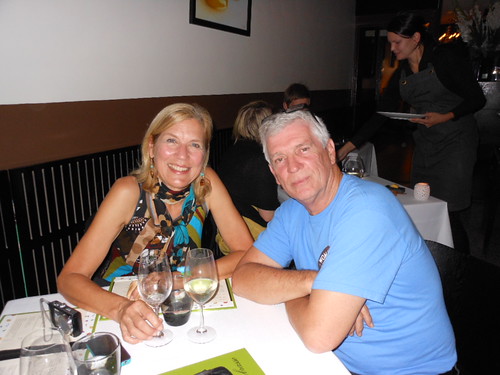 KEYNOTE PANEL (30/11/11) – Challenges and Ops in ICT in Ed
KEYNOTE PANEL (30/11/11) – Challenges and Ops in ICT in Ed
Tony Cook (DEEWR)
Matt Farmer (DEECD – Vic)
Challenges – there are none ;) technolgies can do everything
reaching the end of the age of predicatability
by the time we implement our plan it won't be needed anymore (we take too long!)
language: we need to be in conversations, not lectures; a test for tech: how will this X tech to have a better conversation?
Greg Whitby
look after the present and the future will take care of itself
only one skill matters: learning and re-learning
to change a culture you have to stand in it (the tech culture)
mobility (bring down the walls); integrate
“teachers teach”
we need professional learning networks
desperate need for good OL teachers; “teachers as pedagogical designers”
even the poor have mobiles; personalised learning will kill the dig divide
Learning Futures
3 anchors:
1)diversity – there is no one size fits all
2)learning/teaching (student/teacher/content - Elmore)
3)cloud
“mutate or get out of the way”
copyright, ownership etc is playing catch up in a world that has moved on
write up strategic plans at the end of the year!!!!!!; 5 yr plans are gone forever
Learning Futures – Seizing the Moment
Anne Mirtschin (Hawkesdale P12 College, Vic)
great Net activities with kids in rural school; links kids worldwide, brings in experts eg NY author on story writing
Mike Seyfang
seize the day has become seize the moment; be agile;
#qantasluxury – what to learn?
What do we do from an institutional perspective?
Howard Errey
smart phones, ipads > cloud (circumvents IT/helpdesk)
provide structured support for those moving into the 'new world'
“mutate”! (Whitby)
Why are we so obsessed about changing people who aren't interested????
libraries shd be into collecting info not just 'giving it out'.......
Larry Johnson (NMC)
check key trends section of H/Report eg perceived value of innovation and creativity is increasing ***
Challenges: personalised learning not supported by current practice; inertia of the status quo ('the system')
“the network will change us” “change us” “is us” (aka Wesch); the network has come to represent freedom; is everywhere
3G is replacing the Internet; 71% of world phones have HTML compliant browsers.
Biggest users of mobile are in Asia
for grandchildren (eg Luc and Marcus) the Internet is air.
Make kids' jaws drop ;) ie magic! - “that's all that matters”; (what about Mike Wesch's view about the environment
?)
Susi Steigler – Peters (Gen Manager), Telstra
'change wedges' – seems like a clumsy phrase – 'fries with that wedge'? (or salad?)
learners love to personalise, collaborate, innovate (based on Telstra 'research')
suggests personalised learning pathways – sure, but can you do this for everyone???
Telstra can help broker a “New Education Architecture”
Cost!=s Larry J $100/day just to do his work!!!!!!
!DEA! - allocate a problem for each table!!!!; a la 35 Things - this would work better...(too much one way talk)
DAY 2
Rob Abel – IMS (interoperability made simple)
“If you don't make IT happen IT will happen to you.”
Yes Rob but - the tools outside the school are often better than the tools the school offers
ebooks are their own special category
Larry Fruth – School Interoperability Framework (SIF)
technology is always ahead of policy
Sean Casey – NBN: Broadband Driven Education
will take 9.5 yrs to roll out over the whole country
move from Physical > Digital
post > email
DVD > download
music > iTunes
Science 360 (app)
Google Art Project
school used to be centre of a child's social scene; often no more the case
NBN could enable 3D walk-through of a heart
online ed is a business
NBN obviously has great relevance for flexible learning – anytime/anywhere becomes more possible and better quality
EASSESSMENT STREAM
Darrall Thompson (UTS)
Anne Murchison does agreat job of 'front end' teaching, but got nervous about how she assessess...
Q: What do our assessment processes say about what we value?
Assessment has moved from content > capacity building; addresses a broader range of graduate attributes; ie away from marks > 'interpersonal operability'
ideally shd cross subject boundaries
UTS has developed assessment tool that teacher and student can use and compare; when students can see % (grade) they don't read comments!!
make criteria explicit
Owen O'Neill
many barriers are not technical
how to move people to 'high-stakes' assessment
Melanie Worrall
add 'intentionality' to your assessment processes (a la Nancy White)
Delia Browne
p2pu – peer to peer university http://p2pu.org/en/
social, personal, dynamic, creative – domains of assessment
trying use of badges to verify/validate assessment/achievement
wd be interesting to design a course here WITH participants
are using funding from Hewlitt foundation
[put CC badge on bottom of every slide ***]
people are getting jobs after doing p2pu courses
they are happy for orgs to be involved
OPENING UP LEARNING CONTENT
Martin Dean (Pearson)
students expect to be able to remix/repurpose – so what are Pearson to enable this treatment of content???
Delia Browne – Open Education Resources
30% of the planet are under 15; student uni numbers will peak in 2025; (we will need 4 new unis/wk for the next 15 years to cater for these numbers!!!!!)
[Creative Commons for Educators – guide[check]; http://www.smartcopying.edu.au/scw/Jahia/lang/en/scw/go/pid/956
Helen Lynch – User Generated Content
ugc = homework/assignments !!
Open resources sometimes get used in a manner that was not originally instended
MAKING CONTENT DISCOVERABLE
AUSTRALIAN CURRICULUM CONNECT (Robert Randall)
site has diff points of entry depending on type of student, subject, type of school, etc; parents for example could check what their child is doing in yr 1
DAY 3
DESIGNING FUTURE LEARNING SPACES (REAL AND VIRTUAL)
Phil Long (UQ)
learing is regulated by biology and ecology; learning = development
Amazon now sell more ebooks than print
“active learing spaces”
non-formal learning spaces are critical
redesign to make group work in large spaces
there's a need for theory building – we are not sure yet what works
how do shapes reflect what teacher believes? - some of which are outside!
Many design firms include anthropologists on design teams (cf Mike Wesch)
#learningspacedesign on Flickr (4000 images)
Lee Sansom (Blair Athol Birth to Yr 7 School)
“campfires in cyberspace” (Book by David Thornburg)
calling classrooms 'studios'/learning commons/piazza/watering hole/cave/mountain top
they are using the Khan Academy!!; call teachers 'learning advisers' (?)
contemplating smart tables; using Xbox ad Kinect for Phys Ed and Music
encouraging literacy with multiple devices
Studywiz is their LMS
think about the Qantas Lounge model.....
[check Apples iweb] [maybe see if she would like to do an interview for SIT?]
what about exploiting outdoor learningspaces via landscaping etc?
Pauline Farrell (Box Hill)
StudentWeb (designed by students) – includes Moodle (customised), epfs (Mahara), t/tables, results, how to connect with each other – integration and simplification were critical – nothing too fancy; worked from student wishlist
228 training sessions in 3 months – to give teachers 'love' while you stole their stuff and put it into a repository (Equella?)
StudentWeb allows tracking of learning analytics for each student!!
GPS Learing Pathways ????
refers to Learning Styles :( for each teaching area; shd be learning preferences
have 7000 students using epfs
test each student's digital literacy!!
Jo Dane (Woods Bagot Architects)
lecture theatres are 1600 yrs old!; at that time only the teacher had the knowledge!! so lecture theatres were approriate
'flipped classrooms' – lecture at home; activity in classrooms
other spaces could be capsules, booths, kiosk (scanning, uploading, recharging)
Justine Isard – MyLearning
before we start knocking down the walls....
21c learning spaces favour boys because 1) tend to preference active learning 2) include greater use of technology
if you don't consult about changes people feel disconnected from the changes and will resist it (as is happening with the intro of the Skills for All in TAFE SA at the moment!!; though people in charge of the implementation will argue that there has been consultation.)
advocates keeping the LRCs!!! - they are quiet communal spaces, and is where the info experts are
[check YT video on 'The Twitter Experiment']
RAMONA PIERSON (Promethean)
it's hard to learn to see again
if you consider the mobile as the primary device there is no dig divide
students are cognitively diff to adults (??) rewired?
Can you make technologies do what you want, or are you a victim of it?
OECD countrries have tripled expenditure on ed but outcomes stagnant; reason – focus on 'book learning'?
Edu trends driven by crisis – do more with less, dig content revolution, employability readiness
PARADIGM SHIFT:
schools are adjusting to needs of students (rather than the opposite)
creators to curators
personalised learning
next generation will need to leverage the cloud – ie share not hide
you learn best at the point/moment of failure!
SHIRLEY ALEXANDER (UTS)
Learning Futures: where to from here?
Each new ed tech makes similar claim – self paced, student centred, ete etc; but in essence it hasn't really changed
NBN – will that make the difference??
predicts that 5 yrs on funding will be outcome based
current students are time poor (eg working); they grab moments of learning eg 10 mins on mobile device; degrees taking much longer to be completed
student attendance at lectures decreases over the course of semester!
Stanford's MOOC model a little diff from MIT ie students can do exam [check further]
refers to data analytics [ compare with learning analytics]
PHOTOS FROM THIS EVENT
 Given the
bleak outlook for the VET sector in Victoria - for the TAFE sector anyway - it
was encouraging that ConVerge went ahead this year, and was well attended with
about 300 delegates participating.
Given the
bleak outlook for the VET sector in Victoria - for the TAFE sector anyway - it
was encouraging that ConVerge went ahead this year, and was well attended with
about 300 delegates participating..jpg)


















